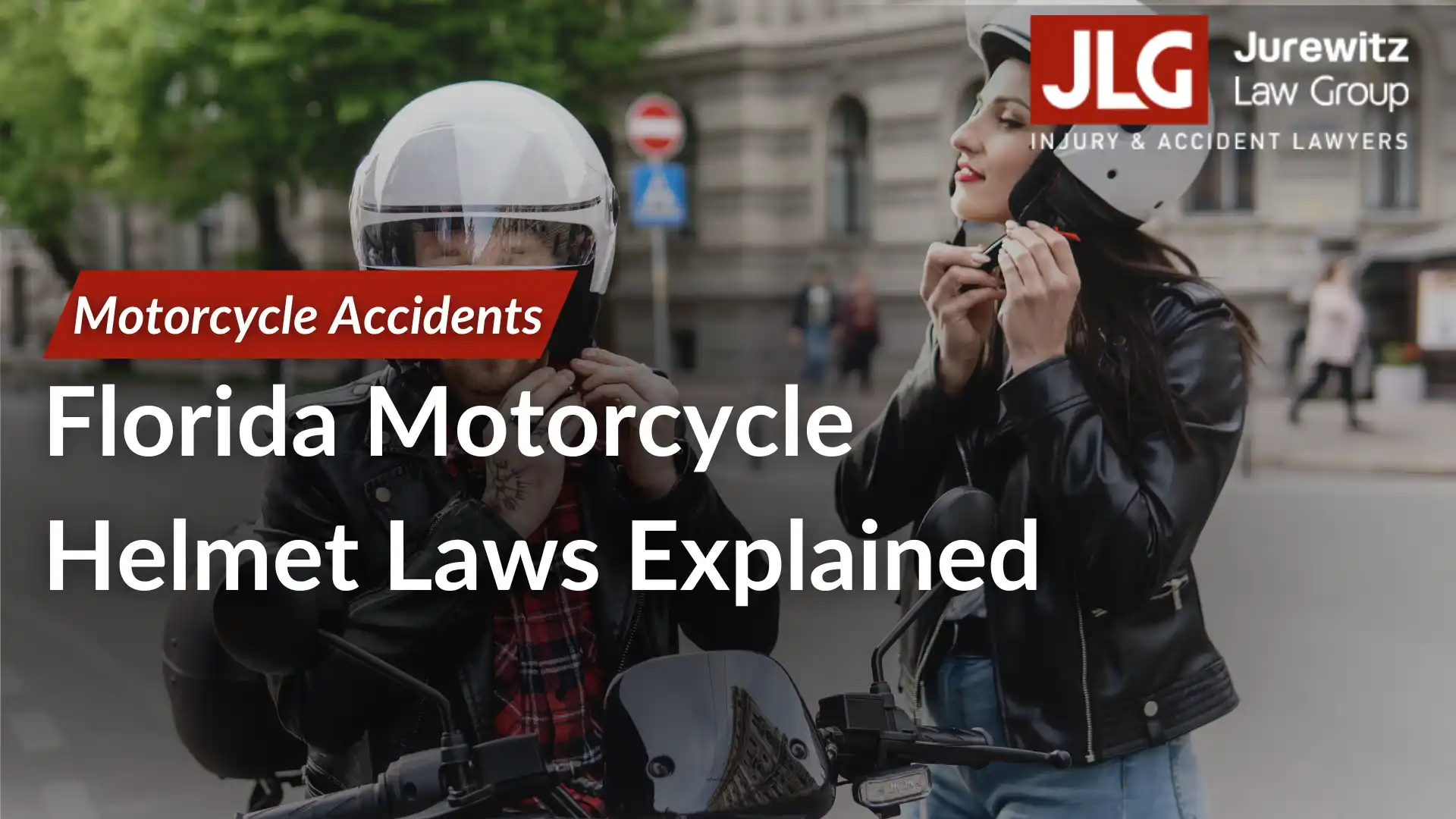
Abiding by all motorcycle safety requirements in Florida is essential. Obeying safety laws limits your risk of injury and guards against legal penalties. It could even affect how much compensation you may receive if you ever file a claim or lawsuit after a wreck. What are some Florida motorcycle helmet laws you should be aware of?
One safety requirement to be aware of is Florida’s motorcycle helmet requirement. Familiarize yourself with the law to ensure you’re in full compliance.
Florida Motorcycle Helmet Laws
Florida law establishes the following requirements for wearing a helmet and protective gear when on a motorcycle:
- Anyone of any age operating or riding a motorcycle as a passenger must wear a helmet. The helmet must comply with Federal Motorcycle Vehicle Safety Standard 218. A helmet’s packaging or tag should indicate whether it meets the required standard.
- Anyone operating a motorcycle must wear eye-protective gear the Florida Department of Highway Safety and Motor Vehicles officially approves of.
In addition, if someone is under 16, they may not operate a moped or ride on a moped as a passenger without a helmet that complies with Federal Motorcycle Vehicle Safety Standard 218.
Merely wearing a helmet isn’t necessarily enough to comply with the law. A helmet must be securely fastened to legally serve its purpose.
Legal Exceptions to Helmet Laws: Insurance Requirements for Riders Without Helmets in Florida
Someone over 21 may not have to wear a helmet while riding on or operating a motorcycle in Florida if they have sufficient insurance coverage. In addition, the law requires them to have an insurance policy offering at least $10,000 in medical benefits for injuries resulting from motorcycle wrecks.
Penalties for Violating Florida Helmet Laws
A violation of Florida’s helmet laws is typically a noncriminal traffic infraction. A nonmoving traffic infraction like this usually incurs a fine of $30.
Impact of Florida Motorcycle Helmet Laws on Motorcycle Accident Claims
What are the impact of helmet laws on motorcycle accident claims? If you sustain injuries in a wreck someone else causes in Florida, you may seek compensation for medical bills and related losses. If the motorist who caused the wreck has sufficient Bodily Injury Liability (BIL) coverage, you can file a claim with their insurance. Filing a lawsuit against them is an option if they don’t have proper insurance.
Comparative negligence in motorcycle accidents can play a role in such a case if you weren’t wearing a helmet properly. Under Florida motorcycle helmet law, if your own carelessness played a role in your head injuries, this will impact how much compensation you may receive. Failing to wear a helmet could prevent you from receiving all the compensation you seek. In these circumstances, an insurance company or defendant could easily argue your injuries would have been less severe had you obeyed the law.
(Note: You may have your own insurance policy. Purchasing motorcycle insurance isn’t a requirement in Florida. However, if you have purchased an optional policy, you may first seek compensation for your injuries by filing a claim with your insurance.)
Additional Motorcycle Safety Requirements in Florida
 Helmet requirements aren’t the only types of safety laws you may need to obey in Florida. Along with basic requirements that apply to all motorists, like speed limits, other motorcycle safety requirements you should be aware of include:
Helmet requirements aren’t the only types of safety laws you may need to obey in Florida. Along with basic requirements that apply to all motorists, like speed limits, other motorcycle safety requirements you should be aware of include:
- To add a motorcycle endorsement to your license, you must first complete an exam under Florida law that establishes your knowledge of how to operate a motorcycle safely. You may skip this test if you can show proof you have completed an approved motorcycle safety education course.
- No one under the age of 16 may be licensed or permitted to operate a motorcycle.
- You may not equip your motorcycle with an exhaust system that’s louder than the exhaust system it came with.
- The height of a motorcycle’s handlebars can’t be higher than an operator’s shoulders. Don’t ride a motorcycle if the handlebars are too high. You may lack the ability to control the vehicle to the degree you assume you can. The law also prohibits a motorcycle operator from carrying packages or other items that may prevent them from adequately holding a vehicle’s handlebars while operating it.
- A motorcycle must have footrests for all passengers.
- Motorcycles requires a horn in good working order whenever the vehicle is on the road.
- A motorcycle requires a minimum of one headlight/headlamp but cannot have more than two. A headlight must always be on when a motorcycle is in operation.
- Lane splitting or riding between lanes is illegal in Florida.
- Attaching a headset to a helmet and using it while riding a motorcycle in Florida is illegal.
- A motorcycle in Florida must have mirrors.
- At a maximum, motorcycles can ride two abreast in a single lane.
What Should You Not Do
Never engage in any type of “stunt” riding while operating a motorcycle. Doing so is against the Florida motorcycle helmet law. If you get hurt while disobeying a Florida safety law, your chances of receiving compensation might be lower than expected.
It’s also wise to search your social media for any pictures indicating you’ve ever engaged in unsafe behaviors while operating a motorcycle. You don’t want to give an insurance company any ammunition to use against you when negotiating a settlement.
For example, a picture showing you riding without a helmet or engaging in a stunt performance could indicate that you’re the type of person to ignore safety laws. If an insurer is trying to prove that you were ignoring such a law when you got hurt in a motorcycle crash, they could reference your social media pictures as evidence.
More importantly, it’s wise to stay off social media in general when a Florida motorcycle accident case is pending. An insurer may be scanning your posts to find content they can use against you.
Contact a Florida Motorcycle Accident Lawyer
Obeying Florida motorcycle helmet laws doesn’t guarantee you will never get hurt in a motorcycle wreck. If you are injured in a motorcycle, a Tampa motorcycle accident attorney at Jurewitz Law Group Injury & Accident Lawyers can help you navigate your legal options. Get started today by contacting us online or calling our law firm at (619) 233-5020 for a free case review. More importantly, our team of lawyers have the necessary experience and skills to get you the best outcome possible.


